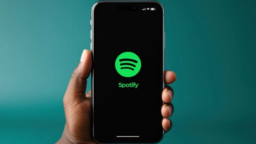Spotify may have just confirmed that ‘superfan clubs’ are coming to its platform.
We’re not sure how intentional the announcement was, but Spotify appears to have revealed this information in a blog post published on its website on Wednesday (January 24).
The post explains that changes are coming to its platform for iPhone users in the EU in March as a result of Apple‘s so-called 30% ‘app tax’ being curtailed by a new law.
According to the blog post, from March 7, iPhone users living in the European Union will be able to buy and subscribe to things directly within Spotify’s app as a result of the DMA, or Digital Markets Act, the landmark competition legislation in the EU that aims to clamp down on big tech ‘gatekeepers’.
Likely of more interest to music rightsholders than Spotify’s ongoing battle with Apple, however, was the news that ‘superfan clubs‘ form part of SPOT’s future vision for its app.
According to Spotify, “thanks to the DMA we’re looking forward to a future of superfan clubs, alternative app stores, and giving creators the ability to safely download Spotify for Artists or Spotify for Podcasters directly from our site — and that’s just the start.”

The concept was repeated elsewhere in the blog post.
“We will be able to communicate clearly with you in the Spotify app about new products for sale, promotional campaigns, superfan clubs, and upcoming events, including when items like audiobooks are going on sale,” according to Spotify.
The conversation around superfans in the music business is getting louder and louder.
Earlier this month, in their respective New Year’s memos, Warner Music Group CEO Robert Kyncl and Universal Music Group Chairman and CEO Sir Lucian Grainge both spoke about their companies’ plans to focus more on superfans this year.
Grainge said in his memo, that following UMG’s focus over the past year on getting streaming platforms to adopt an ‘artist-centric’ approach, the company’s strategy will now be centered on “strengthening the artist-fan relationship” and specifically through “superfan experiences and products”.
“We will be able to communicate clearly with you in the Spotify app about new products for sale, promotional campaigns, superfan clubs, and upcoming events, including when items like audiobooks are going on sale.”
Spotify
Said Grainge: “We first focused on a fairer way to allocate the streaming pie among real artists by addressing fraud and other aspects that deprive artists of their just compensation,” he explained.
“The next focus of our strategy will be to grow the pie for all artists, by strengthening the artist-fan relationship through superfan experiences and products.”
He also revealed that UMG is “already in advanced discussions with [its] platform partners regarding this phase and will have more to announce in the coming months”.
Could the next phase of Universal’s strategy include subscription-based ‘superfan clubs’ that exist within Spotify, or could these ‘superfan clubs’ be standalone apps developed by record companies and linked directly to Spotify?
The new changes that Spotify says are coming into effect on its iPhone app in the EU in March also include the ability for users to see the pricing for locked audiobooks and purchase them directly within the app, rather than being directed to Spotify’s website to do so.
Back in September 2022, MBW asked if Spotify’s locked audiobook model could be a new way for artists to make money on its platform.
We suggested that allowing artists to lock individual pieces of audio content, and charge for access to it, could be a new way for Spotify to let artists generate potentially significant additional revenue from superfans.
Have Apple’s App Store rules been standing in the way of such an innovation all this time?
“For years, even in our own app, Apple had these rules where we couldn’t tell you about offers, how much something costs, or even where or how to buy it. The DMA means that we’ll finally be able to share details about deals, promotions, and better-value payment options in the EU.”
Spotify
In most markets, Apple’s billing service charges a so-called ‘App tax’ of up to 30% for apps and in-app purchases. Some app developers and lawmakers argue that this is an ‘anti-competitive’ practice.
Spotify currently directs users to its own website to make changes to their subscription plans and has done so since 2016. At present, a message is displayed within user accounts that states: “You can’t make changes to your plan in the app. We know it’s not ideal.”
According to Spotify, for iPhone users in the EU, that won’t be the case as of March 7, when it plans to introduce in-app purchases when the rules stipulated by the Digital Markets Act come into effect in the EU.
Spotify says that the law will prohibit Apple from charging Spotify and other developers a 30% ‘app tax’ on each transaction in its in-app purchase system. It also prevents Apple from restricting developers from promoting offers and deals to their customers, Spotify’s blog post notes.
“For years, even in our own app, Apple had these rules where we couldn’t tell you about offers, how much something costs, or even where or how to buy it,” said Spotify in the blog post.
“The DMA means that we’ll finally be able to share details about deals, promotions, and better-value payment options in the EU.”
Spotify published several mockups in its blog post of what it plans to roll out in March, including promotional messages about deals and pricing for audiobooks.

“Soon we expect that if you want to buy a Premium subscription or an audiobook, or are looking to seamlessly upgrade from Individual to a Duo or Family plan to save money, you will be able to do so with just a couple of easy clicks,” reads Spotify’s blog post.
“Right now you can’t upgrade from Free to Premium in the app, and we’re not even allowed to tell you about how much our various subscriptions cost, how you can save money, or where to purchase them. That doesn’t make sense. For everyone living in the EU, this is about to change.”Music Business Worldwide




